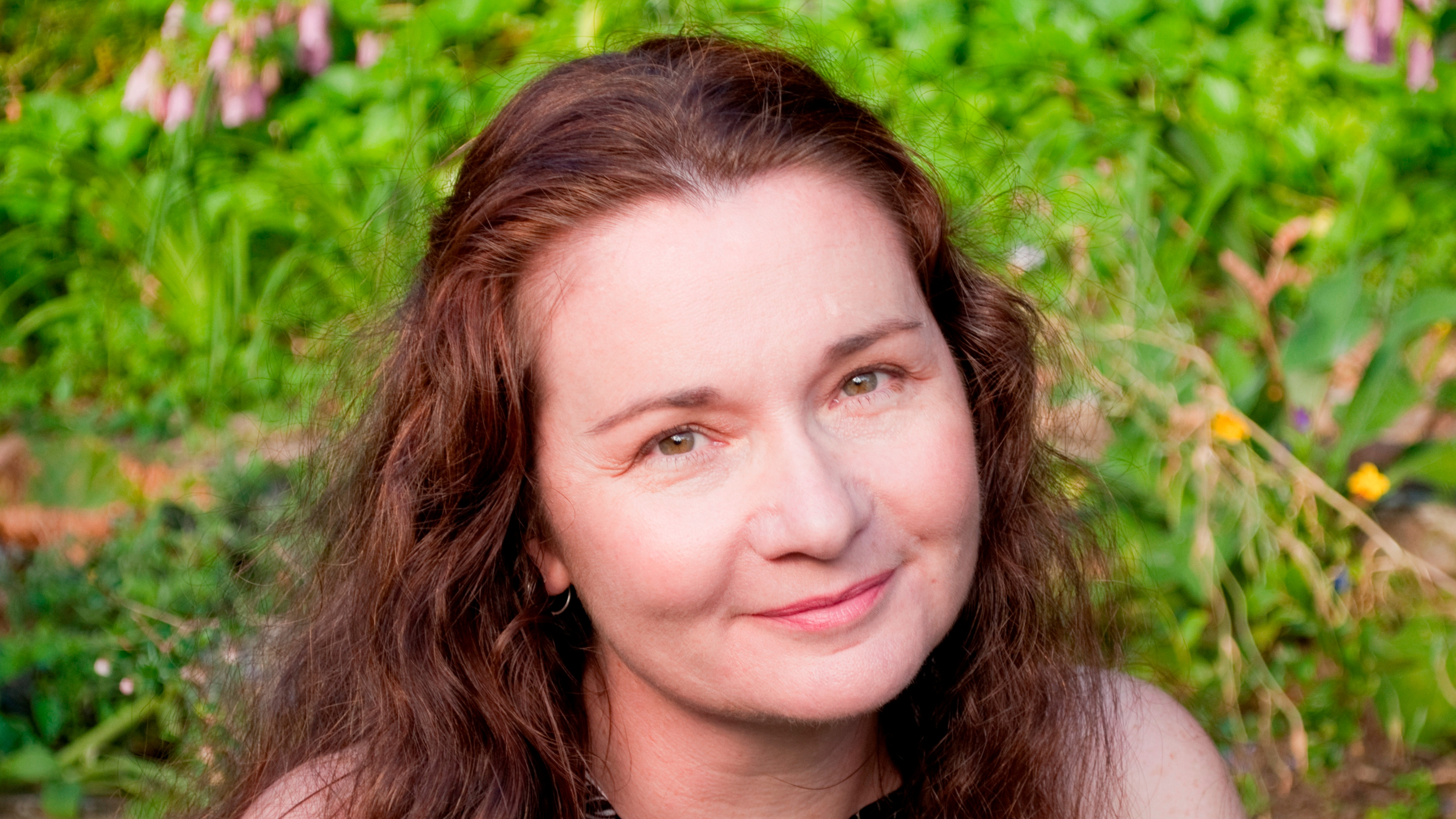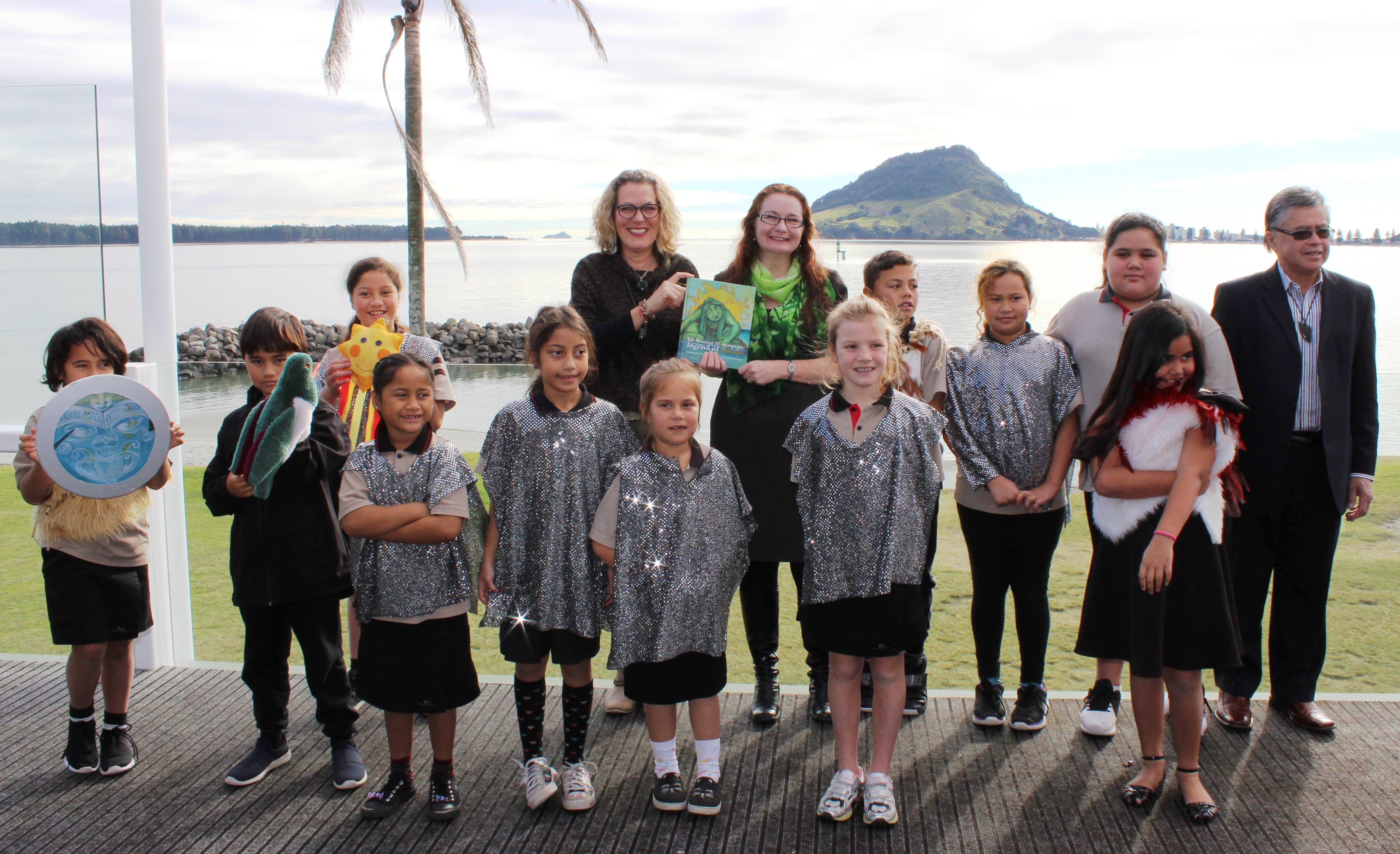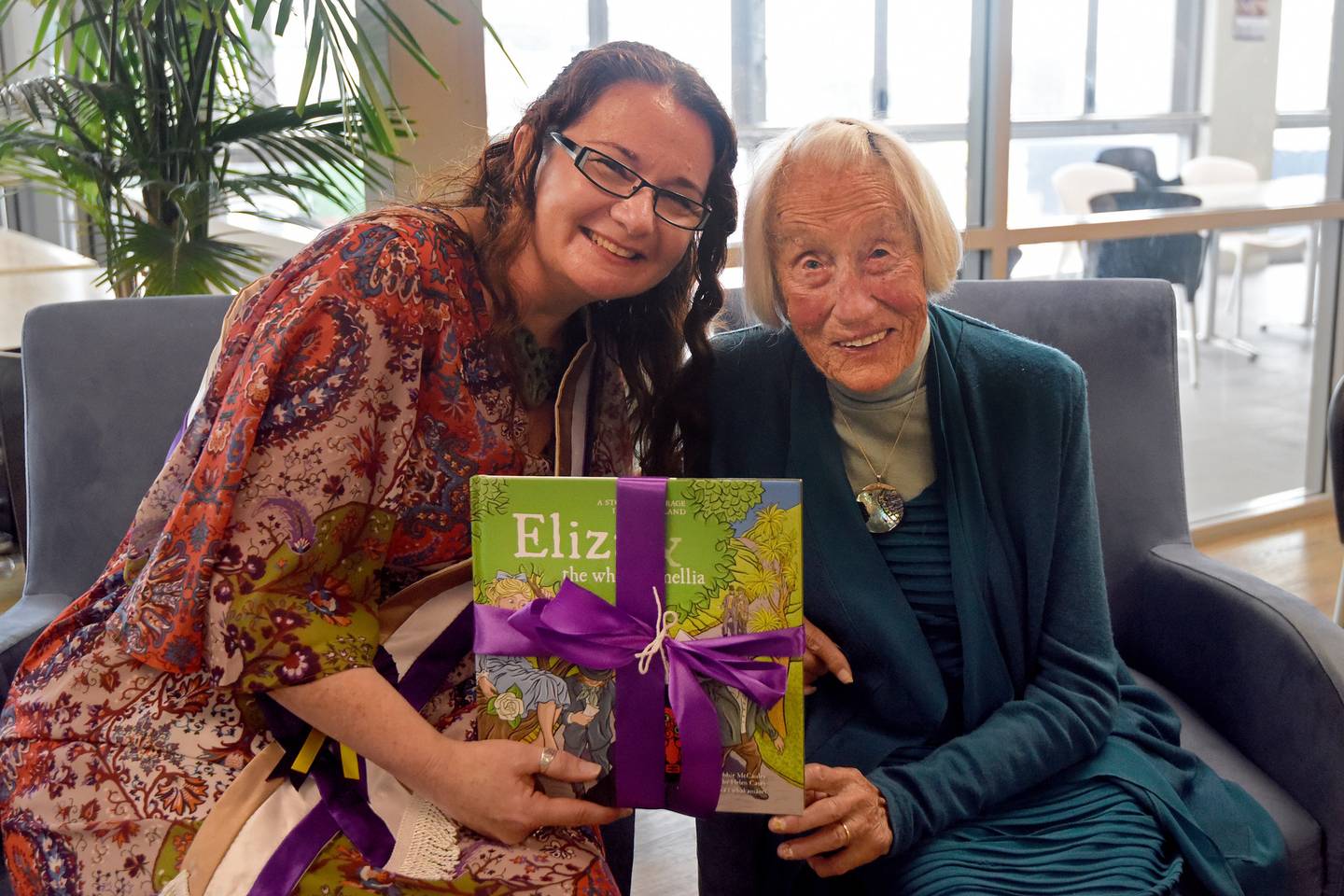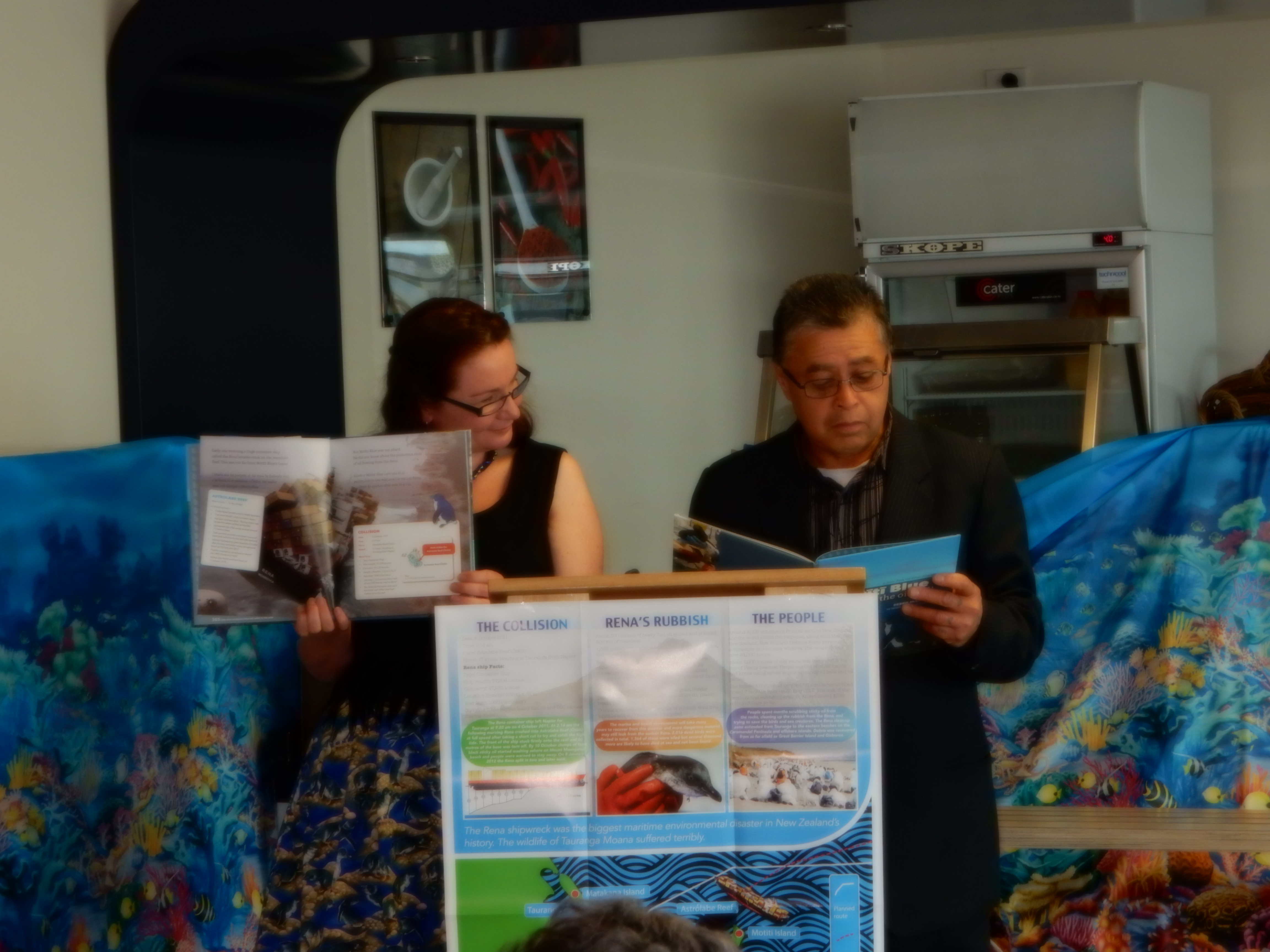Debbie McCauley is an award-winning author, historian, indie publisher, librarian and poet with a passion for telling the stories of her local area and community. Philippa Werry finds out how she goes about it all.

I first met Debbie in Wellington at the 2015 New Zealand Book Awards for Children and Young Adults. Her book Mōtītī Blue and the Oil Spill: A Story from the Rena Disaster was about to win the Non-Fiction Award, to her total surprise and delight. (It was also shortlisted for the LIANZA Children’s Book Awards 2015 and was a White Raven selected by the International Youth Library in Munich.) Mōtītī Blue, like Debbie’s other books, bears witness to her deep interest in and love for telling stories of local history from Tauranga Moana.
I was lucky enough to find myself sitting next to her, and we chatted about various things, including her earlier book, Taratoa and the Code of Conduct. This was the first time I had heard about the Battle of Gate Pā – and if you haven’t heard of it, then I recommend you track down Debbie’s book, or read about it on the Tauranga Memories website. Hearing Debbie talk about Gate Pā made me want to know more and I’m very grateful to her for sparking my interest in that important and significant part of NZ history.

At the 2015 Book Awards, Debbie had one of her lovely daughters with her, but no outside publisher support, as she is her own publisher. She set up Mauao Publishing in 2012 and has published six books under that imprint, doing everything herself, from research, writing and editing to book design, printing, marketing and distribution, as well as organising translations and illustrations. She is a librarian (with a special interest in local history and children’s literature) at Tauranga City Libraries and writes articles for Tauranga Memories, the library’s heritage website. She was on the organising committee for the 2014 Battle of Gate Pā sesquicentennial and is on the Māori Events Team at Tauranga City Libraries, which organises the annual Matariki Tauranga Moana festival.
Debbie and I had an email conversation over a very hot week at the end of January. I wanted to ask her about her interest in local and family history, how she goes about the process of consultation around using Māori history and how she fits everything into her busy life.
Philippa: Some of the descriptions that I’ve read about you are words like talented, hardworking, persistent and creative. And I’m not surprised! You completed a Bachelor of Arts over nine years while working part-time. You’ve set up your own publishing company, and written and published six books as well as numerous articles, poetry and plays, while still working as a librarian – all on top of a busy family life. You’ve been involved in suffrage commemoration events and even got to meet Helen Clark, and you support the work of Bookrapt, the Bay of Plenty Children’s Literature Association. That’s a lot of balls to juggle! How do all the different parts of your writing, working and family life mesh together?
Debbie: I think ‘mess’ of life would more describe our chaos! If I waited until the housework was done and the lawns mowed, then I’d never find time to write. Luckily I love the flowers in my lawn and the ‘lived-in’ nature of our little commune which includes my husband, two children (& one partner), 89-year-old mother-in-law, and, next door is my mother who often has my two great-nieces to visit. Often I just drop everything, and read a book with a nice cup of tea (Dilmah!).
I think ‘mess’ of life would more describe our chaos! If I waited until the housework was done and the lawns mowed, then I’d never find time to write.
P: You have a passion for telling local stories: Gate Pā, the Rena disaster, the copy of the Treaty of Waitangi that came to Tauranga. I came across a lovely article you wrote recently for Library Life where you talk about the feedback from the local community: the students from a total immersion school who grabbed the Taratoa book off the library shelves, saying, ‘Wow, this is our story from Pukehinahina’, before throwing themselves down on the floor cushions to read it together. The woman who said to you about Mōtītī Blue, ‘Those are my hands in that photograph’.
You’ve also tackled some challenging topics, including parts of our national history that can be uncomfortable for us to face. What kind of writing topics attract you, or how do you decide on a new topic?
D: Some ideas are sparks that fizzle out, others catch into flame. It must be a topic I’m prepared to put a lot of time, effort, and cold hard cash into. I write about what I’m drawn to, and at the moment that is non-fiction stories that I feel our society needs. We can’t tuck the hard parts of Aotearoa’s history away. Our stories need to be out in the open and talked about if we are ever to become truly bi-cultural and leave racist and misogynist attitudes in the past.
Our stories need to be out in the open and talked about if we are ever to become truly bicultural and leave racist and misogynist attitudes in the past.
P: Family is obviously important to you. Eliza and the White Camellia is based on the story of one of your ancestors, and you even organised a family reunion! As a ‘fifth-generation Pākehā New Zealander whose earliest ancestor arrived in Aotearoa in 1841’, can you tell us a bit about your family, and those first arrivals to New Zealand?
D: My earliest ancestors arrived in Wellington on board the Tyne on 9 August 1841. They were the Hart family, the parents and older siblings of Suffragist Eliza Wallis (nee Hart), who was born in Wellington on 30 March 1846. Eliza was my fourth great aunt and a founding member of the National Council of Women in 1896 and along with several other relatives signed the 1893 Women’s Suffrage Petition.
Other ancestors helped pioneer the ‘Ulster Plantation’ at Katikati and Cambridge in the Waikato. My relatives include a Royal NZ Fencible, an inmate on prison hulks, matron of the Female Factory at Paramatta; a Gallipoli nurse awarded the Military Medal and an adoptee of the infamous Minnie Dean.

P: There must be some amazing stories in there! I like the idea of taking women’s stories out of the background and paying tribute to their role in shaping history.
D: Absolutely, women’s stories have often been relegated to the background in the roles of wives, mothers, daughters and housekeepers. I’ve tried to tell some of the forgotten stories of the women of my family through my page, Herstory.
P: Many of the people and topics you have written about are deeply embedded in Māori culture and history. I’m impressed by the sensitivity and respect with which you treat these stories, and the way in which te reo Māori is integral to the text of your books. As a Pākehā New Zealander, how do you go about the process of consultation with local iwi and kaumatua around using Māori history in your stories, and what advice would you give to other writers or illustrators who might feel uncertain how to do this?
D: This dates back to 2013-2014 when I found myself helping to organise the Battle of Gate Pā commemoration in Tauranga. I gained a lot of respect for local kaumatua, met wonderful people, and built up mutual relationships of trust. Kaumatua and Kuia have asked me to please keep going as they love what I do. I’ve had people in tears thanking me. I’m not here to rip off Māori culture. I’m here to help tell stories in collaboration with iwi in a way that will help children (and adults!) understand the history. A cup of tea and a chat is never to be underestimated. I feel blessed to have such support, and follow my heart.
I’m here to help tell stories in collaboration with iwi in a way that will help children (and adults!) understand the history.
During my studies I wrote a paper on Māori Cultural Intellectual Property which deepened my understanding of the issues (see Meeting the Needs of Local Iwi? Biculturalism and Māori Cultural Intellectual Property (2008) by Debbie McCauley.
P: Your books are beautiful objects to look at and handle: hard-cover, crammed full of information and meticulously proof-read. Mōtītī Blue, for example, is a stunning work of production, right down to the 365 little blue penguins on the endpapers. What led you to create Mauao Publishing in the first place, and what has been your experience of publishing your books by yourself? Any highlights or hiccups? Do you have any tips for other writers who might feel it’s just too hard to do so?
D: Oh major! Sometimes I feel it would be so much easier to let a big publisher do all the hard work like chasing up unpaid invoices! My last book cost $15,665.55 to produce and as I was turned down for funding, I need to make that money back on sales before I can even look at producing another book – every book sale is extremely important. Mauao Publishing can’t afford to pay its author (me), so thank goodness for the Public Lending Right fund!
Despite all the issues and hard work, my stories are local, my heart tells me that they need to be written and produced locally. As a librarian, we see poorly constructed books fall apart and stories that aren’t worth the paper they’re written on. Children need quality in both content and production. I can’t see the point of doing it otherwise.
Children need quality in both content and production. I can’t see the point of doing it otherwise.

P: Lastly – you might not want to talk about works in progress, but have you got any ideas for what you might write about next?
D: This year I produced a book with Arataki School Children and Zespri called, Maia the Brave – a Type 2 Diabetes Story. A version to sell is being illustrated at present, so hopefully that will be out by the end of 2019 if I can get some funding. There are so many ideas that I’m having trouble deciding what to focus on after that. I know that I need to build up a file of illustrators’ work – one of the hardest things is finding the right style for each story! At present though, there is much going on at the library and lawns that need mowing as well as gardens that would love to be weeded and watered!
P: Thanks so much, Debbie, and best wishes for your future writing and for more beautiful books coming to us from Mauao Publishing!
Bibliography:
The McCauley Family of Katikati, New Zealand, 1876-2012 (Mauao Publishing, 2012)
Taratoa and the Code of Conduct: A Story from the Battle of Gate Pā (Mauao Publishing, 2014) Illustrated by Sophie McCauley and translated into Te Reo Māori by Tamati Waaka
Mōtītī Blue and the Oil Spill: A Story from the Rena Disaster (Mauao Publishing, 2014) Translated into Te Reo Māori by Tamati Waaka
The Treaty of Waitangi in Tauranga: Te Tiriti o Waitangi ki Tauranga Moana (Mauao Publishing, 2018) translated into Te Reo Māori by Tamati Waaka
Ko Mauao te Maunga: Legend of Mauao (Mauao Publishing, 2018) illustrated by Debbie Tipuna, translated into Te Reo Māori by Tamati Waaka
Eliza and the White Camellia: A Story of Suffrage in New Zealand (Mauao Publishing, 2018), illustrated by Helen Casey and translated into Te Reo Māori by Tamati Waaka
See also:
http://artbop.co.nz/talented-hardworking-and-persistent-tauranga-childrens-author-debbie-mcauley/
http://tauranga.kete.net.nz/tauranga_local_history/topics/show/907-article-index-debbie-mccauley
A PASSION FOR PUBLISHING CHILDREN’S BOOKS (Library Life 465, March 2018) https://lianza.org.nz/sites/default/files/LL%20465%20March%202018_0.pdf
Philippa Werry
Philippa Werry is a children’s writer who began her career writing for the School Journal. Since then, her non-fiction, stories, plays and poems have been widely published and several of her titles (including The Telegram, Enemy at the Gate and Anzac Day: the New Zealand Story) have been shortlisted for book awards or named as Storylines Notable Books.



